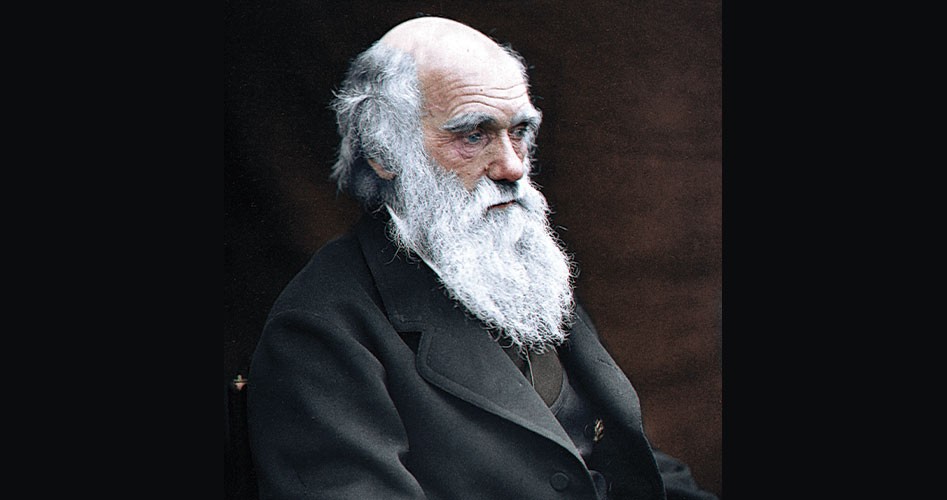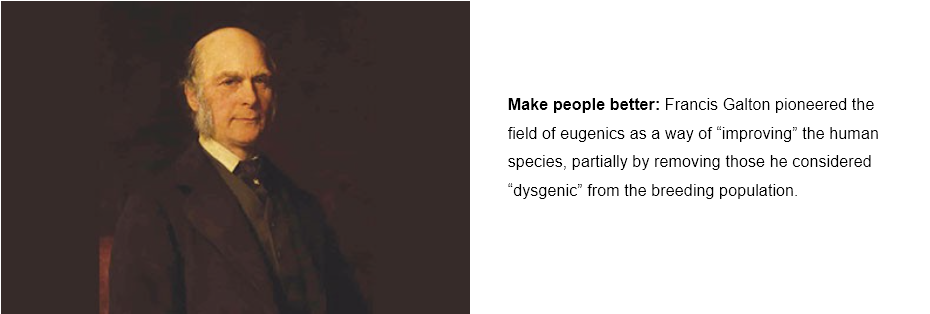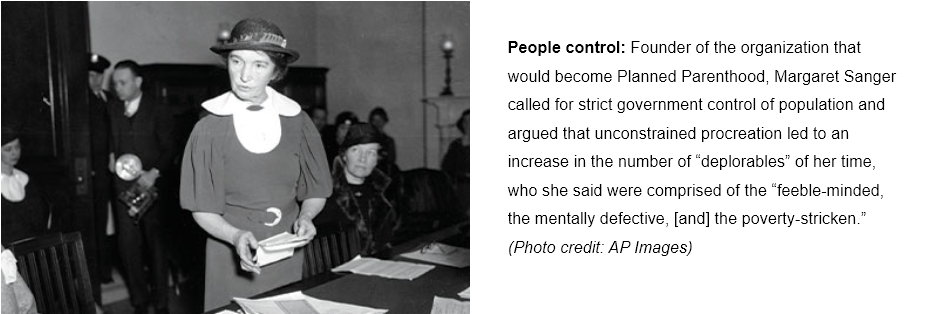
Flickr/JuliusJääskeläinen
The Evil History of Eugenics
The belief that humans can be “perfected” through managed selective breeding received its modern kickoff from Darwin and Francis Galton in the U.K., and quickly spread to America, where it developed into a platform for “scientific” totalitarian tyranny.
By Dennis Behreandt
For more than a century it has been fashionable among certain “intellectuals” and their elite oligarch clientele to believe, as opposed to the Christian notion that a perfect paradise awaits in Heaven for those who believe in Christ and repent of their sins, that a paradise can be built here on Earth, in the here and now, if only those “chosen” to survive and thrive can be perfected.
Those of this mindset had the intellectual framework for this idea implanted in their weak minds by the works of Charles Darwin and by Gregor Mendel. Darwin, of course, sketched out his ideas of evolution, and Mendel, working with peas in his garden, figured out the basics of the heritability of traits.
It is necessary to put Darwin into proper context. To today’s average American, and especially to the committed political “progressive,” Darwin is a key patron saint of secularism. He “discovered” and “proved” evolution and cannot be questioned. Anyone who does question Darwin is, therefore, a backwards rube at best, and perhaps a dangerous and deluded flat-earther, redneck deplorable.
But Aerospace engineer and nuclear engineering expert Robert Zubrin, Ph.D. put Darwin into proper historical perspective in his 2012 book Merchants of Despair. “Darwin did not discover evolution,” Zubrin pointed out. Indeed, he continued, “not only was the concept prominently published by leading Enlightenment biologists … but it was understood in pre-Darwin popular culture as well. For example, Washington Irving’s humorous A History of New York: From the Beginning of the World to the Fall of the Dutch Dynasty, published in 1809 (the year of Darwin’s birth), recounts an extended history of the development of the Earth and all its life, starting from a pre-solar system nebula.”
More important in its implications is the intellectual foundation of the Darwinian perspective. Zubrin pointed this out: “Darwin’s novel contribution was not the discovery of evolution but the presentation of a plausible explanation for it in the form of his theory of natural selection.” This grew directly out of the overpopulation concerns of Thomas Malthus, Zubrin noted:
Basing his ideas on Malthus’s theory of limited resources in combination with Victorian philosopher Herbert Spencer’s concept of “survival of the fittest,” Darwin proposed that all progress, both in nature and among mankind, occurs by superior strains out-competing inferior varieties as part of the “struggle for existence” in the face of limited resources.
Zubrin went on to note the obvious: This idea — that some species are more fit than others, and that it is entirely natural for the fitter to replace the unfit — is incredibly poisonous when applied to individual humans. This “purported universal law of nature when applied to human affairs leads to wildly incorrect conclusions (some by Darwin himself) and catastrophically unethical policies (by his followers),” Zubrin pointed out.
Darwin’s work was influential immediately, especially among his own family members. One of these was Francis Galton, Charles Darwin’s first cousin. Galton was the son of a very wealthy arms manufacturer and thus had access to the fine educational advantages that money could provide. These were not wasted on him, as he was notably advanced intellectually as a child. Born in 1822, he was studying medicine by age 16 in 1838 at Birmingham General Hospital.
Galton was more than a medical student, though. As did many in England and America at that time, he wanted to pursue exploration and adventure, and he set off to Southern Africa. His travels made him relatively famous on his return, and he was elected to the Council of the Royal Geographical Society. As a result of this and his growing fame, Galton met many of England’s leading scientists and thinkers. Among them, the Galton Institute points out, was “Herbert Spencer — who devised the expression ‘survival of the fittest’ — whose view was that cultural and biological evolution were two sides of the same coin.”
Make people better: Francis Galton pioneered the field of eugenics as a way of “improving” the human species, partially by removing those he considered “dysgenic” from the breeding population.

The seeds of a certain strain of thought were planted in Galton’s mind, and were solidified by the publication of his cousin’s theory of evolution. Darwin’s work “served to affect Galton’s thinking profoundly, confirming his agnosticism and sowing the seeds of his thoughts.” And those thoughts were about how the doctrine of “survival of the fittest” might be employed to perfect mankind. Francis Galton would dedicate his life to this effort and would coin the name of the program he pursued “eugenics.”
Galton was convinced that managed application of Darwinian ideas to human populations could be used to build a better version of the human species. A virulent racist, he wanted the “inferior” human groups to die out and be replaced by their betters.
Galton set out his ideas in an essay titled “Hereditary Improvement” in 1873. Immediately, he stated that humans could be “improved.”
“It is objected that, philosophise as you will, men and women will continue to marry as they have hitherto done, according to their personal likings; that any prospect of improving the race of man is absurd and chimerical, and that though enquiries into the laws of human heredity may be pursued for the satisfaction of a curious disposition, they can be of no real importance,” he wrote.
He continued, “In opposition to these objections, I maintain, in the present essay, that it is feasible to improve the race of man.” His odious racism provides a hint as to whom he counts among the “deplorables” of his age. Speaking of the potato famine in Ireland, he wrote that visitors there after the famine “generally remarked that the Irish type of face seemed to have become more prognathous, that is, more like the negro in the protrusion of the lower jaw; the interpretation of which was, that the men who survived the starvation and other deadly accidents of that horrible time, were more generally of a low and coarse organisation.”
Other problematic groups that Galton identified map exactly to the modern-day blue-collar Americans in the so-called “basket of deplorables” described by former secretary of state and failed presidential candidate Hillary Clinton. Referring to the blue-collar workers of his age, Galton wrote, “The reports of the health of our factory towns disclose a terrible proportion of bad constitutions and invalidism among the operatives, as shown by intermitting pulse, curved spine, narrow chests, and other measurable effects.” Lamenting that just 20 years earlier a healthier and more rural stock proliferated, he concluded, “We have therefore much reason to bestir ourselves to resist the serious deterioration which threatens our race.”
What to do about this? Galton wondered. In answer: “The highest action of all is to provide a vigorous, national life, and … one practical and effective way in which individuals of feeble constitution can show mercy to their kind is by celibacy, lest they should bring beings into existence whose race is predoomed to destruction by the laws of nature.”
He continued, “It may come to be avowed as a paramount duty, to anticipate the slow and stubborn processes of natural selection, by endeavouring to breed out feeble constitutions, and petty and ignoble instincts, and to breed in those which are vigorous and noble and social.”
Here is the essential formula of eugenics — the idea that people can be perfected. This dangerous notion, stemming from Darwin and given form by Francis Galton, has persisted down to the present day in one form or another.
Eugenics in America
Crossing the Atlantic, Galton’s noxious ideas found fertile ground in the United States in the form of Charles Davenport. One of the most celebrated American scientists of his era, Davenport was a committed believer in eugenics and in weeding out the inferiors of the species. He thought of humans — other than himself, of course — as a farmer might view his livestock, referring to “the human babies born each year” as “the world’s most valuable crop.” Consequently, he argued in his book Heredity in Relation to Eugenics, “The general program of the eugenicist is clear — it is to improve the race by inducing young people to make a more reasonable selection of marriage mates; to fall in love intelligently. It also includes the control by the state of the propagation of the mentally incompetent.”

People control: Founder of the organization that would become Planned Parenthood, Margaret Sanger called for strict government control of population and argued that unconstrained procreation led to an increase in the number of “deplorables” of her time, who she said were comprised of the “feeble-minded, the mentally defective, [and] the poverty-stricken.” (Photo credit: AP Images)
His dangerous and defective ideas drew praise from the highest points of American politics and culture, even from a one-time occupant of the White House. Just four years after leaving office, former president Theodore Roosevelt wrote a glowing letter to Davenport in January 1913.
“My dear Mr. Davenport,” Roosevelt wrote, “I am greatly interested in the two memoirs you have sent me. They are very instructive.” The former president continued, “I agree with you if you mean, as I supposed you do, that society has no business to permit degenerates to reproduce their kind. It is really extraordinary that our people refuse to apply to human beings such elementary knowledge as every successful farmer is obliged to apply to his own stock breeding. Any group of farmers who permitted their best stock not to breed, and let all the increase come from the worst stock, would be treated as fit inmates for an asylum. Yet we fail to understand that such conduct is rational compared to the conduct of a nation which permits unlimited breeding from the worst stock, physically and morally.”
Sanger and Singularity
Davenport and Roosevelt were far from the only prominent Americans to favor control on “unlimited breeding.” Margaret Sanger, favorite “saint” of the “progressive” Left and chief originator of Planned Parenthood, was strongly in favor of eugenics. In 1932, she described her desired program in a speech titled “My Way to Peace.” Policy, she said then, should “keep the doors of Immigration closed to the entrance of certain aliens whose condition is known to be detrimental to the stamina of the race, such as feeble-minded, idiots, morons, insane, syphiletic, epileptic, criminal, professional prostitutes, and others in this class…. Apply a stern and rigid policy of sterilization and segregation to that grade of population whose progeny is already tainted or whose inheritance is such that objectionable traits may be transmitted to offspring.”
In a detailed policy proposal, Sanger called for Congress to create a body to manage the nation’s population. This “Parliament of Population Directors” would “direct and control the population through Birth rates and immigration, and direct its distribution over the country according to national needs consistent with the taste, fitness and interest of the individuals.” Among other things, she called for “a stern and rigid policy of sterilization.” Under the reign of terror she proposed, “the whole dysgenic population would have its choice of segregation or sterilization.” These unfortunates would also be enslaved by the state under Sanger’s plan: “There would be farm lands and homesteads where these segregated persons would be taught to work under competent instructors for the period of their entire lives.” Sanger’s full “Plan For Peace” was published in Birth Control Review in April 1932. It has direct parallels with the deadly and demonic plans that actually were put in place in central Europe not long after and that killed millions under the direction of the National Socialist German Workers Party — better known as the Nazis.
Despite this Sanger continues to be highly regarded by the women’s rights movement and by the political Left in general, although there is no denying that her eugenicist views bear a seriously uncomfortable similarity to those in Nazi Germany and elsewhere that have resulted in the most thoroughgoing and bloodiest genocidal regimes in all human history.
Alarmingly, eugenics hasn’t disappeared, despite its awful history. As gene-editing technologies are broadly in use, even used in China — controversially — to modify children, calls are being made for using eugenics practices to produce “better” children.
The preeminent case in point is a 2018 paper by Professor Jonathan Anomaly of the University of Pennsylvania, defending eugenics and calling for a return to its practices. In his paper, titled “Defending Eugenics,” he worried about current “dysgenic” demographic trends and “offered a guardedly optimistic account of how some public policies might increase the extent to which our reproductive choices are both individually rational and collectively desirable.”
Modern eugenics, however, is much more than selective breeding of the classical variety; it includes proposals for dramatic tech “upgrades” that move human society to beyond what some theorists call the technological “singularity” — the point in time when humans supposedly are transformed into something new, fulfilling much more than the wildest dreams of eugenics founders Galton and Davenport.
If achieved, what these new “version 2.0” humans will be is anyone’s guess. But the unstated consequence of this “achievement” is that human’s version 1.0 — us — will cease to exist.
This article is excerpted and adapted from the soon-to-be published book End Game, Chapter Three, “Secular Perfection.”
Published with Permission of thenewamerican.com